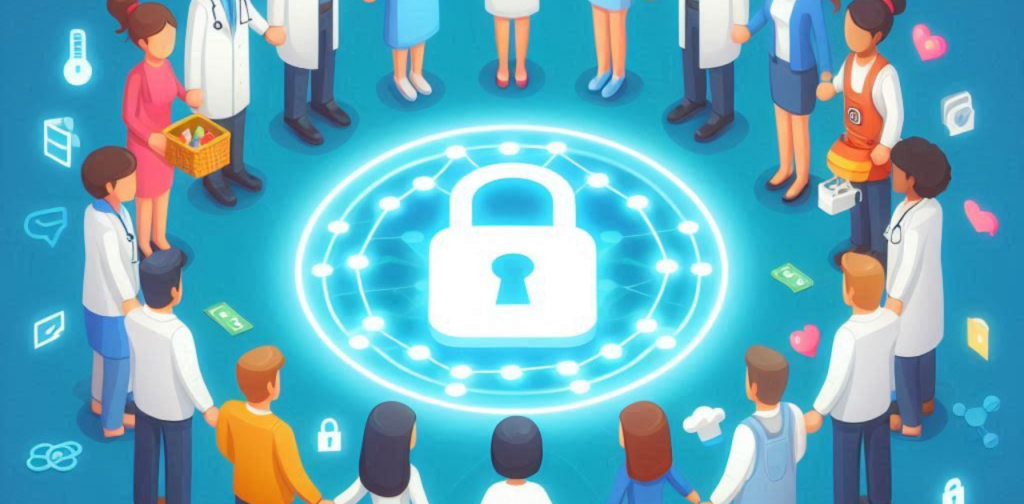Contents
Securing Our Identity: Blockchain for Identity Management
In today’s digital world, managing identity can be a complex and difficult task. Traditional identity management systems often rely on centralized databases, which can be vulnerable to breaches and fraud. With its independent security and decentralization, blockchain offers a revolutionary approach to identity management, giving individuals more control over their personal data. This article explains how blockchain can revolutionize the ways we use our identities online and in the real world. ###Empowering Individuals: Benefits of Blockchain-based Identity Management
- Decentralized control: Individuals base their identity data on a secure blockchain, giving them control over who can access and use their information. * Increased security: Unsecured bank accounts ensure the identity and authenticity of data, reducing the risk of fraud and data breaches. * Improved privacy: Individuals can choose which aspects of their identity to share, promoting more control over their privacy. * Accessibility: Block-based identities can be accessed from anywhere with an internet connection, potentially reaching unbanked populations that lack traditional forms of identification. * Streamlined processes: Automating identity copying through smart contracts can greatly improve efficiency in a variety of areas. Here is a table comparing traditional identity management and block-based varieties:
| KT | Traditional Identity Management | Block-based Identity Method | |—|—|—|
| O.V. | Centralized control by authority | Regulation by decentralized control | | Security | Aware of breaches and data manipulation | Highly secured and unsecured ledger | | Privacy | Limited control over data sharing | Individual chooses what information they want to share | | Accessibility | Limited access for unbanked populations | Easy from anywhere with the internet | | Functions | No paper processes and paper-based documentation | Free with smart contracts |
Building a secure future: Challenges and opportunities

While blockchains offer an attractive solution for identity management, some issues need to be addressed:
- Scale latency: Accommodating large numbers of users on blockchain networks may be challenging with the technology currently in place. * Standardization: Fewer standardized protocols on different blockchains may create interoperability issues. * Regulation: Uncertain regulatory frameworks around data privacy and technology need to be outlined. * User adoption: Dynamic-based identity management requires widespread user education and trust-building activities. Despite these considerations, the opportunities are significant:
- Reduction of identity theft: Identity theft and fraud can be reduced substantially due to the secure nature of blockchains.
- Financial inclusion: Individuals with limited access to traditional identities can participate in the digital economy. * Improved KYC/AML processes: Make your know-your-customer KYC and anti-money laundering (AML) processes more secure. * Cross-border identity management:Secure and seamless identity management across borders can be facilitated.
Conclusion: A paradigm shift in identity management
Blockchain technology has the potential to revolutionise the way we manage our identities. By promoting personal control, enhancing security and improving access, blockchain can usher in a new era of security and holistic identity management. Here collaboration between companies and developers committed to taking control and realising the full potential of blockchain is key for a more secure and holistic digital future. ### Frequently Asked Questions
- How is blockchain-based identity management being used today?

Pilot programmes are exploring the use of blockchain for identity management in a variety of areas, including government-issued IDs, refugee registration and access to healthcare. * What are the benefits of using blockchain for identity management?
Businesses can benefit from faster and more secure customer onboarding compatibility, reduced fraud risk, and improved compliance with KYC/AML adversaries.
- What is the future of blockchain for identity management?
As the technology advances and continues to evolve, blockchain is expected to play a central role in creating more secure, user-aware, and globally interoperable identity management systems.
In today’s digital world, managing identity can be a complex and difficult task. Traditional identity management systems often rely on centralized databases, which can be vulnerable to breaches and fraud. With its independent security and decentralization, blockchain offers a revolutionary approach to identity management, giving individuals more control over their personal data. This article explains how blockchain can revolutionize the ways we use our identities online and in the real world. ###Empowering Individuals: Benefits of Blockchain-based Identity Management
- Decentralized control: Individuals base their identity data on a secure blockchain, giving them control over who can access and use their information. * Increased security: Unsecured bank accounts ensure the identity and authenticity of data, reducing the risk of fraud and data breaches. * Improved privacy: Individuals can choose which aspects of their identity to share, promoting more control over their privacy. * Accessibility: Block-based identities can be accessed from anywhere with an internet connection, potentially reaching unbanked populations that lack traditional forms of identification. * Streamlined processes: Automating identity copying through smart contracts can greatly improve efficiency in a variety of areas. Here is a table comparing traditional identity management and block-based varieties:
| KT | Traditional Identity Management | Block-based Identity Method | |—|—|—|
| O.V. | Centralized control by authority | Regulation by decentralized control | | Security | Aware of breaches and data manipulation | Highly secured and unsecured ledger | | Privacy | Limited control over data sharing | Individual chooses what information they want to share | | Accessibility | Limited access for unbanked populations | Easy from anywhere with the internet | | Functions | No paper processes and paper-based documentation | Free with smart contracts |
Building a secure future: Challenges and opportunities
While blockchains offer an attractive solution for identity management, some issues need to be addressed:
- Scale latency: Accommodating large numbers of users on blockchain networks may be challenging with the technology currently in place. * Standardization: Fewer standardized protocols on different blockchains may create interoperability issues. * Regulation: Uncertain regulatory frameworks around data privacy and technology need to be outlined. * User adoption: Dynamic-based identity management requires widespread user education and trust-building activities. Despite these considerations, the opportunities are significant:
- Reduction of identity theft: Identity theft and fraud can be reduced substantially due to the secure nature of blockchains.
- Financial inclusion: Individuals with limited access to traditional identities can participate in the digital economy. * Improved KYC/AML processes: Make your know-your-customer KYC and anti-money laundering (AML) processes more secure. * Cross-border identity management:Secure and seamless identity management across borders can be facilitated.
Conclusion: A paradigm shift in identity management
Blockchain technology has the potential to revolutionise the way we manage our identities. By promoting personal control, enhancing security and improving access, blockchain can usher in a new era of security and holistic identity management. Here collaboration between companies and developers committed to taking control and realising the full potential of blockchain is key for a more secure and holistic digital future. ### Frequently Asked Questions
- How is blockchain-based identity management being used today?
Pilot programmes are exploring the use of blockchain for identity management in a variety of areas, including government-issued IDs, refugee registration and access to healthcare. * What are the benefits of using blockchain for identity management?
Businesses can benefit from faster and more secure customer onboarding compatibility, reduced fraud risk, and improved compliance with KYC/AML adversaries.
- What is the future of blockchain for identity management?
As the technology advances and continues to evolve, blockchain is expected to play a central role in creating more secure, user-aware, and globally interoperable identity management systems.

